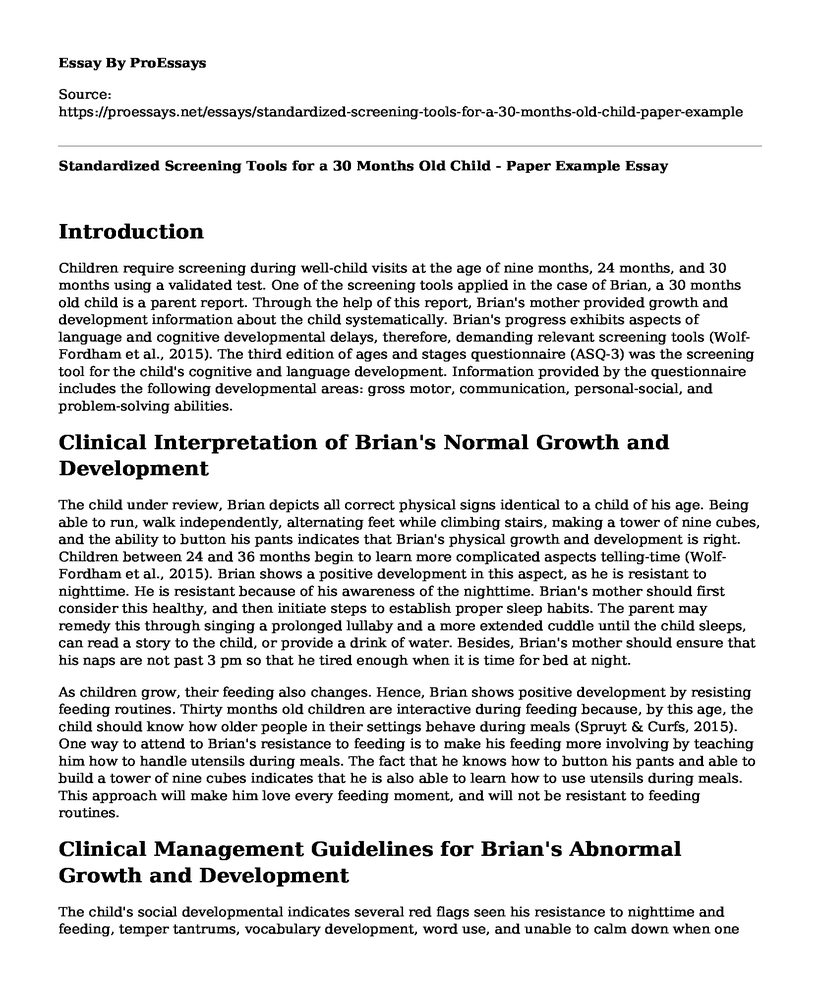Introduction
Children require screening during well-child visits at the age of nine months, 24 months, and 30 months using a validated test. One of the screening tools applied in the case of Brian, a 30 months old child is a parent report. Through the help of this report, Brian's mother provided growth and development information about the child systematically. Brian's progress exhibits aspects of language and cognitive developmental delays, therefore, demanding relevant screening tools (Wolf-Fordham et al., 2015). The third edition of ages and stages questionnaire (ASQ-3) was the screening tool for the child's cognitive and language development. Information provided by the questionnaire includes the following developmental areas: gross motor, communication, personal-social, and problem-solving abilities.
Clinical Interpretation of Brian's Normal Growth and Development
The child under review, Brian depicts all correct physical signs identical to a child of his age. Being able to run, walk independently, alternating feet while climbing stairs, making a tower of nine cubes, and the ability to button his pants indicates that Brian's physical growth and development is right. Children between 24 and 36 months begin to learn more complicated aspects telling-time (Wolf-Fordham et al., 2015). Brian shows a positive development in this aspect, as he is resistant to nighttime. He is resistant because of his awareness of the nighttime. Brian's mother should first consider this healthy, and then initiate steps to establish proper sleep habits. The parent may remedy this through singing a prolonged lullaby and a more extended cuddle until the child sleeps, can read a story to the child, or provide a drink of water. Besides, Brian's mother should ensure that his naps are not past 3 pm so that he tired enough when it is time for bed at night.
As children grow, their feeding also changes. Hence, Brian shows positive development by resisting feeding routines. Thirty months old children are interactive during feeding because, by this age, the child should know how older people in their settings behave during meals (Spruyt & Curfs, 2015). One way to attend to Brian's resistance to feeding is to make his feeding more involving by teaching him how to handle utensils during meals. The fact that he knows how to button his pants and able to build a tower of nine cubes indicates that he is also able to learn how to use utensils during meals. This approach will make him love every feeding moment, and will not be resistant to feeding routines.
Clinical Management Guidelines for Brian's Abnormal Growth and Development
The child's social developmental indicates several red flags seen his resistance to nighttime and feeding, temper tantrums, vocabulary development, word use, and unable to calm down when one tries to comfort him. Given that he is 30 months old, Brian should be able to follow two-steps commands. Only following a one-step command insinuates developmental delay. Following commands is synonymous with language and vocabulary development (Oche-manley et al., 2013). A child who understands more words uses approximately four hundred and fifty vocabularies and forms two words sentences stand a better chance of following two-step commands. Singing most of the time to Brian, using a higher pitched type of voice commonly known as "motherese voice can help speed up his language development and subsequently, improve his command following.
Brian is below average in terms of the ability to form sentences because on average, a child of his age should construct at least two or three words sentences. In addition, the vocabulary development of Brian is below expectations for a child of his age. A 30 months old child should be able to use approximately 450 words. He is lagging way behind his typically developing peers. Play and activity are ways of encouraging language development among children of Brian's age that his parents should embrace. Brian's mother should take some time to talk to him, which can include asking her child what interests him. Other strategies that apply to Brian's case include listening to stories read to him more often, asking him open-ended questions that will compel him to provide answers using sentences, and singing many songs to him.
References
Oche-manley, L., Dietzen, L., Nankin, J., & Beigel, A. (2013). Revolutionizing child welfare with outcomes management. The Journal of Behavioral Health Services & Research, 40(3), 317-29.
Spruyt, K., & Curfs, L. M. G. (2015). Non-pharmacological management of problematic sleeping in children with developmental disabilities. Developmental Medicine & Child Neurology, 57, 2, 120-136.
Wolf-Fordham, S. B., Curtin, C., Maslin, M., Bandini, L., & Hamad, C. D. (2015). Emergency preparedness of families of children with developmental disabilities: What public health and safety emergency planners need to know. Journal of Emergency Management.
Cite this page
Standardized Screening Tools for a 30 Months Old Child - Paper Example. (2022, Jul 29). Retrieved from https://proessays.net/essays/standardized-screening-tools-for-a-30-months-old-child-paper-example
If you are the original author of this essay and no longer wish to have it published on the ProEssays website, please click below to request its removal:
- How IT Competencies are Essential to Nursing Research
- Research Paper on Epidemiology of a Chronic Disease
- Breach of the Code of Conduct for Nurses on Person-Centered Care - Paper Example
- Multimodal Medium Essay: Need for Personal Fitness
- The Black Americans Community's Determinants of Health Essay Example
- Research Paper on Nurse Practitioner's Ethical & Legal Issues with Prescribing Medication
- Paper Example on Patient Inclination & Approval in COPD Treatment: Outcomes of a RCT







